Below is an article about Kajiado, the town where we would lke to do some programming. We traveled there a week ago towards Namanga. The drought has worsened an already difficult life. Many children are not going to school and are instead looking for food and money to buy food. Here is this morning's article entitled "Land of the Dying". We are sending a social worker and a masai interpreter to initiate a baseline survey to see what services we can offer, if any.
By DAVE OPIYO April 1 2009 at 21:17
The stench of cattle carcasses left to rot in the bushes is unbearable. Flies buzz around the carcasses, occasionally landing and feasting on the remains as dogs watch from a distance. They have seemingly refused to fill their stomachs with the free food. It is midday and the sun is quite hot. Just a few metres away, a young Maasai moran is driving a herd of about 50 emaciated cows home from the watering hole, oblivious of the foul smell. The day has not been good for him. Despite waking up very early in the morning, his animals have not had enough water to drink and food to eat. This is now a normal happening.
But even as we struggled hard to stifle the awful stench by covering our noses with andkerchiefs, Mr Mutungi Lesingo, a resident of the Kajiado Central constituency, Rift Valley province, who is in our company, looks disturbed. We are about 160 kilometres from Nairobi on the road to Namanga, the town on the Kenya-Tanzania border. The area is represented in Parliament by Defence assistant minister Joseph Nkaiserry.
Mr Lesingo is sadly witnessing the collapse of his “huge empire” of cattle, which took him years to amass, in a matter of days and there is nothing much he can do to save it. The carcasses strewn all over the area were once part of his large herd of cattle. Today, they belong to flies and scavengers. Mr Lesingo, who has four wives and 12 children, was by last December the proud owner of more than 300 head of cattle – a rich man by any standards. But now, the number of animals in his boma (compound) is less than 150. The drought has taken its toll, not only in Kajiado, but also in the rest of the country.
In the past month alone, Mr Lesingo has lost more than 40 animals. He is not alone. The same story is replicated in other areas. Surprisingly, goats and sheep in the area have not been much affected by the drought as they feed on the shrubs that dot the area. According to Mr Lesingo’s Maasai culture, an individual’s riches are determined by the number of cattle he owns. The more you have, the richer you are.
Mr Lesingo says the failure of the rains has spelt doom for his cattle, which now face the twin problem of lack of pasture and water to drink. “We are in many instances faced with a dilemma – deciding whether to feed ourselves or feed our cattle. I tell you, it’s a situation that many of Kenyans would not like to be in,” he says. It is for this reason that the pastoralist decided to sell some of his livestock hoping to replenish the number in future.
But this has further worsened his problems. No one wants to purchase cattle on the verge of death. And like Mr Lesingo, many pastoralists facing the same predicament have brought their emaciated livestock for sale. Unfortunately, very few people are interested. A cow that normally goes for Sh30,000 ($375.00) is currently being sold at as low as Sh300 ($3.75). And even with this low price, the businessmen still don’t attract buyers. The pastoralist says that despite their predicaments, neither the government nor relief organisations had come to their aid, forcing several of the pastoralist communities to flee to the neighbouring Tanzania in search of pasture for their animals andThey are now appealing to the government to come to their aid, failure of which many will continue suffering from famine.
The weatherman has already sounded a warning that the long rains are bound to delay in some
area, further spelling doom for the residents. In its latest weather outlook for the month of April, Mr Peter Ambenje, an official from the Meteorological department says pasture for livestock will continue to diminish in the pastoral areas due to the expected poor rainfall performance. And he advises the pastoralists to destock and only remain with “strategic stock”.
Further he urges the government to rehabilitate watering points to avoid conflicts and civil insecurity that is likely to emanate from water scarcity. Says Mr Ambenje: “In these areas, there have been a few cases of animals dying following the prolonged dry spell and poor and limited pasture conditions.” He adds: “Some perennial rivers have even dried up due to the huge rainfall deficits for consecutive months".
skip to main |
skip to sidebar



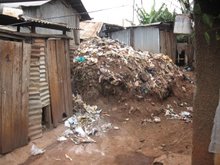
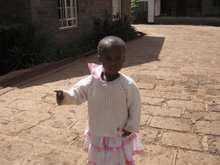

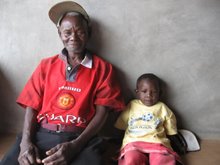
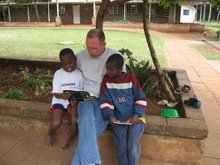


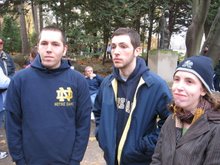
At ND Game

I am this grateful!
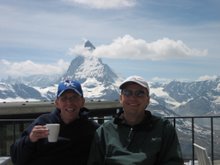
Ed and Chris

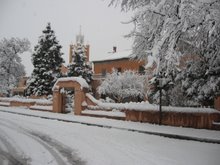
OLD TOWN

Assisi 2006

A Leap
The spiritual journey is one of continually falling on your face, getting up, brushing yourself off, looking sheepishly at God, and taking another step.
THE MASAI WOMEN EMPOWERMENT PROJECT
For more information on the Masai Project in Athi River, please visit the following site:
www.mwep.blogspot.com
To donate: please see below.
www.mwep.blogspot.com
To donate: please see below.

DONATE
WANT TO DONATE?
If you would like to donate to my journey and my projects in Kenya, checks may be sent to :
Immaculate Heart of Mary Parish
MISSION FUND
5876 Veterans Way
Burlington KY 41005
Make sure it is marked clearly for Ed Colina's Mission work.
If you would like to donate to my journey and my projects in Kenya, checks may be sent to :
Immaculate Heart of Mary Parish
MISSION FUND
5876 Veterans Way
Burlington KY 41005
Make sure it is marked clearly for Ed Colina's Mission work.
LOOK AT SOME PICS OF THE VILLAGE - Some other good VILLAGE BLOGS
UPDATE PICS ON FLICKR
ALSO - CHECK OUT MICHAEL'S AFRICAN BLOG
Jennifers Blog from Kenya - More Village Info
Both have info and pictures from the Nyumbani Village
ALSO - CHECK OUT MICHAEL'S AFRICAN BLOG
Jennifers Blog from Kenya - More Village Info
Both have info and pictures from the Nyumbani Village
CONTACTING E.M.C.
COOL SITE
The best way to contact me beginning in September is via email. I'll get it when I can. I am not sure how often I will be able to get into Nairobi from the Village - whether monthly or less frequently. ecolina@aol.com Pics should be posted here.
Donations can be made via the school. 859 689-4303 They will be forwarded to me by my daughter. It is all appreciated and will be well-used!
Packages to Kenya are discouraged because of the customs costs upon arrival. Snail mail can be sent to the address listed here and I'll get mail when in Nairobi. Email is probably best.
Beginning August 14th my U.S. cell phone is no longer in operation.
The best way to contact me beginning in September is via email. I'll get it when I can. I am not sure how often I will be able to get into Nairobi from the Village - whether monthly or less frequently. ecolina@aol.com Pics should be posted here.
Donations can be made via the school. 859 689-4303 They will be forwarded to me by my daughter. It is all appreciated and will be well-used!
Packages to Kenya are discouraged because of the customs costs upon arrival. Snail mail can be sent to the address listed here and I'll get mail when in Nairobi. Email is probably best.
Beginning August 14th my U.S. cell phone is no longer in operation.
Family Celebration

By Mahatma Gandhi
Recall the face of the poorest peson you have seen and ask yourself if the next step you take is going to be of any use to that person.
"Feed the Children" Video Clips
There are a couple of interesting Kibera Slums video clips from Feed the Children Organization. I have no association with the organization but was interested in the clips. CLIPS HERE


Some Background on Kibera Slum
The slum originated in 1920 as a Nubian soldiers' settlement. The British colonial government of the time allowed them to squat on a hillside outside Nairobi, primarily because the British felt the Nubian population could be trusted during the Kikuyu-dominated Mau Mau movement of the 1950s.
After Kenyan independence in 1963, however, various forms of housing were made illegal by the government, rendering Kibera unauthorised on the basis of land tenure. Essentially, since the early 1970s landlords have rented out their property to a significantly greater number of tenants than legality permits. Since the tenants, who are extremely poor, are unable to obtain or rent land that is "legal" according to the Kenyan government, the slum-dwellers find the rates offered to be comparatively affordable. The number of residents in Kibera has increased accordingly despite its unauthorised nature.
This process has been exacerbated because, over time, other tribes have moved into the area to rent land from the Nubian landlords. Since then, the Kikuyu have come to predominate the population and by 1974 had effectively gained control over administrative positions. This demographic change subsequently determined which of the dwellings, all of which are technically illegal, are demolished or permitted by the government. This occurs primarily through political patronage, as certain owners are protected by local government officers largely based on their Kikuyu ethnicity, and changes in administrative personnel may have drastic impacts on a landlord's security.
Kibera has residents coming from all the major ethnic backgrounds with some areas being specifically dominated by one tribe (eg. Kisumu Ndogo that is predominantly Luo). Many are coming from rural areas due to the problems of rural underdevelopment. This multi-ethnic nature coupled with the tribalism of Kenyan politics has led Kibera to be the site of small ethnic conflicts throughout its near 100 year history (most recently in 2002 in which many resident's homes were attacked by arson).
Kibera is located southwest of Nairobi city centre and is the same size as Manhattan's Central Park (approximately 2.5 square kilometres (600 acres)). Nairobi Dam is to the south. It is sited approximately 5 km south east of the city centre of Nairobi. It holds more than a quarter of Nairobi's population. The estimated population density is 300,000/km². There are a number of villages, including Kianda, Soweto, Gatwekera, Kisumu Ndogo, Lindi, Laini Saba, Siranga/Undugu, Makina and Mashimoni.
A railway line passes through Kibera, thus passengers heading for Kisumu can view the slum. Kibera has a railway station, but due to absence of effective commuter train system in Nairobi, most Kibera residents use buses and Matatus to reach city centre. However, riding the Matatus proves to be considerably dangerous, due to the occasional carjacking that goes on in Nairobi especially in the evenings and at the end of the month. Irresponsible driving in the area and poor traffic law enforcement also makes travel perilous.
Kibera is heavily polluted by soot, dust, and other wastes. Open sewage routes, in addition to the common use of Flying toilets, also contribute to contamination of the slum with human and animal faeces. The combination of poor nutrition and lack of sanitation accounts for many illnesses. Not only are death by disease and conflict common inside this slum, but it is estimated that 1/5 of the 2.2 million Kenyans living with HIV live in Kibera.
Winnie - 2 Years Old

NYUMBANI INFORMATION
Kibera Podcast - Mature Viewing

Radio Interview with Fr. D'Agostino
KIMANZI AND A GRANDFATHER

AIDS in Africa
Presently there are 40 million people infected with HIV/AIDS globally, with more being infected every day. HIV/AIDS is 100% lethal if left untreated. The UN estimates that 68 million people will die in sub-Saharan Africa because of AIDS in the next twenty years.
That is:1.7 times more than the 40 million deaths in World War II, the most destructive war in human history.
5 times more than the 13 million deaths in the previous two decades of the AIDS epidemic.
307 times more than the 221,000 deaths in the Asian tsunami disaster of 2004.
Other Statistics:In 1990 there were 7 million people infected with HIV/AIDS in sub-Saharan Africa.
In 2000 there were 25.3 million infected.96 percent of HIV infected persons live in developing nations where drug therapies are largely unaffordable.
Presently there are approximately 15 million children orphaned by AIDS in sub-Saharan Africa. That number is expected to grow to 40 million in the next two decades.
3 million people died of AIDS in 2000. 12.1 million children were orphaned.
Every 5 minutes 3 people die of HIV/AIDS. That is over 850 deaths every day or 315,000 a year. With each death, at least one more orphan is usually left.
Every minute 10 people are infected with HIV/AIDS, which equates to 600 new infections an hour, 15,000 a day.
Friends

EMC in ASSISI

Enquirer Article
I agreed to talk to the Enquirer in hopes that it might more widely advertise our search for a new principal. I appreciate the article but am embarrassed. Now it's official - I have to do something! Here it is.
Fun . . .
"Pulling out the chair beneath your mind And watching you fall upon God - There is nothing else for Hafiz to do that is any fun in this world!"-Shamsud-din Mohammed Hafiz Muslim Mystic (1320-89)
Ash Barker - Make Poverty Personal
"The idols of this age say you can buy meaning in life in a department store, while the real God weeps that creation has swallowed such delusions whole without chewing and longs for us to love our neighbour in need. The starving millions have no voice against the shrieks of temporal happiness those pursuing such items risk all for. Authentic loving of God and neighbour then is still the great need of the hour ."

Henri Nouwen
"People who pray stand receptive before the world. They no longer grab but caress, they no longer bite but kiss, they no longer examine but admire."
Merton Gets It Right
"My first human act is the recognition of how much I owe everybody else."
My 3 Loves

At ND Game
Zermatt Summer 2006

I am this grateful!
For Times Like These

Ed and Chris
New Year's Eve Prayer
God of the seasons, Lover of the ages, Master of every moment: You who are beyond time yet within all time. We return to you what you have given to us — the moments, the minutes, the hours, the days, the weeks, the months, and the year of 2006. Time has been gracious to us again, and we thank you for freely giving us these human bodies, these events, and these relationships. We have lived another year and we have died another year, and now you are granting us the beginnings of another.
We now hand over to you the blessed year, 2006, with all that it gave us and all that it took from us, knowing that both are necessary, just like our breath. We trust you in both the givings and the takings, the inhalings and the exhalings. May every breath of 2007 be a breath of the Holy Spirit, joyfully received and joyfully returned, beginning with this one right now.
Amen
God Alone-New Year's Eve

Merton Speaks
"MY LORD GOD, I have no idea where I am going. I do not see the road ahead of me. I cannot know for certain where it will end. Nor do I really know myself, and the fact that I think that I am following your will does not mean that I am actually doing so. But I believe that the desire to please you does in fact please you. And I hope I have that desire in all that I am doing. I hope that I will never do anything apart from that desire. And I know that if I do this you will lead me by the right road though I may know nothing about it. Therefore will I trust you always though I may seem to be lost and in the shadow of death. I will not fear, for you are ever with me, and you will never leave me to face my perils alone."
New Years - New Mexico

OLD TOWN
Perfect Joy

Assisi 2006
Blog Archive
- August (1)
- June (1)
- May (10)
- April (7)
- March (21)
- February (5)
- January (4)
- December (8)
- November (5)
- October (1)
- September (5)
- August (3)
- July (4)
- June (10)
- May (6)
- April (1)
- March (5)
- February (11)
- December (15)
- November (10)
- October (15)
- September (8)
- August (13)
- July (7)
- June (7)
- May (5)
- April (13)
- March (8)
- February (10)
- January (8)
Interlaken Summer 2006

A Leap